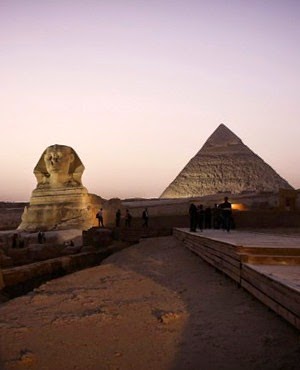Cairo - Under increasing pressure from the military, Egypt's deadliest jihadist group pledged allegiance to the Islamic State organisation in a bid to boost recruitment and bolster its fight against the army, analysts say.
Ansar Beit al-Maqdis (Partisans of Jerusalem) has waged an insurgency from its Sinai Peninsula stronghold that has killed scores of Egyptian police and soldiers since the army ousted Islamist president Mohamed Morsi last year.
In response, the army has launched a huge operation in Sinai targeting jihadists and last month began building a buffer zone on the border with Gaza to stem the flow of militants and weapons from the strip.
The military announces the arrest or killing of alleged militants in Sinai on a near-daily basis, in claims which are not independently verified.
"[Ansar Beit al-Maqdis] seems to be looking to internationalise their position, perhaps in response to increasing pressure on the ground from the Egyptian security forces," said Hisham Hellyer, senior fellow in International Security Studies at the Royal United Services Institute in London.
The group's announcement is the most significant show of support for IS in the region outside Iraq and Syria, suggesting its influence now rivals that of its once-dominant Al-Qaeda rivals.
"They [Ansar Beit al-Maqdis] are suffering from lack of resources as Egyptian security forces besiege Sinai," said Eman Ragab, an expert on regional security at the Cairo-based Ahram Centre for Political and Strategic Studies.
"Pledging allegiance to IS would help gain the sympathy of youths who could be recruited from other groups, or help get logistical support from ISIS itself."
Recruitment drive
Unlike its jihadist rivals, the ISIS group has a straightforward message that is also a selling point for Ansar Beit al-Maqdis recruiters, according to a Cairo-based expert on terrorism in the Middle East speaking on condition of anonymity.
"Its message is much more simple than Al-Qaeda and is aimed at the masses who have limited knowledge of religion, and they get influenced by calls to kill Americans, Shiites or others."
Ismail al-Iskandrani, a researcher at the Paris-based Arab Reform Initiative, agrees that the new allegiance will help recruit fighters to Ansar Beit al-Maqdis.
"Pledging allegiance in itself is an attempt to recruit IS supporters and sympathisers... especially since Ansar Beit al-Maqdis has suffered losses in recent operations," he said.
"They are attempting to create a sanctuary for young jihadists who want to join ISIS in Egypt."
But unlike IS, which claims to want to establish a "caliphate" across the region, Ansar Beit al-Maqdis harbours more local ambitions, targeting mainly Egyptian soldiers and policemen.
The group has so far focused its attacks on security forces, and once bombed a tourist bus on the border with Israel, killing three South Koreans.
It has also urged Egyptians to fight Morsi's ouster.
IS threat rises
Iskandrani said the "real concern" was that Ansar Beit al-Maqdis could target supporters of the Egyptian army "like Christians or embassies of countries participating in the coalition against ISIS".
The new allegiance "makes the threat [of ISIS] even more obvious," said Karim Bittar, research director at Paris's Institute of International and Strategic Relations.
"Its ability to strike Middle Eastern or international targets is also multiplying," Bittar said.
"There is a ripple effect and as long as Daesh momentum is unstopped, many will want to join the bandwagon," he said, referring to IS's Arabic acronym.
